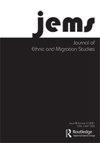复原力和身份:过去、现在和未来在被迫移徙者生活中的作用
IF 2.8
1区 社会学
Q1 DEMOGRAPHY
引用次数: 0
摘要
复原力经常被用来理解被迫移民如何面对逆境。它通常被描述为嵌入更广泛的社会环境的过程,这需要个人对正在发生的变化作出反应的能力。虽然许多文献关注的是弹性增强因素,但对弹性的主观理解却被忽视了。我们以Krause和Schmidt[2020]的想法为基础。“难民当演员?”关于自力更生和复原力的全球难民政策的批判性思考。难民研究杂志33(1):22-41。https://doi.org/10.1093/jrs/fez059]通过研究个人对过去的记忆、现在的经历和对未来的抱负在恢复过程中所起的作用,研究了不同时间对个体代理的重要性。利用来自英格兰东北部被迫移民的照片启发研究的数据,我们将重点放在了三个关于韧性的个人账户上。我们的研究强调了个人如何主动做出战略选择,并为自己的幸福承担责任——即使这取决于改变潜在的结构性问题。我们表明,尽管在英国发现了一个充满敌意的移民环境,但个人能够采取行动并适应他们的环境,尽管这在一定程度上是有限的。我们展示了时间在个人恢复过程中是如何起作用的——对一些人来说,时间既是恢复力的一种策略,对另一些人来说,时间是恢复力的破坏者。本文章由计算机程序翻译,如有差异,请以英文原文为准。
Resilience and identities: the role of past, present and future in the lives of forced migrants
Resilience has often been used to understand how forced migrants cope in the face of adversities. It is generally described as a process embedded into the wider social environment, which entails the ability of individuals to respond to ongoing change. While much literature focuses on resilience-enhancing factors, advancing a more subjective understanding of resilience has been neglected. We build on ideas by Krause and Schmidt [2020. ‘Refugees as Actors? Critical Reflections on Global Refugee Policies on Self-Reliance and Resilience.’ Journal of Refugee Studies 33 (1): 22–41. https://doi.org/10.1093/jrs/fez059] on the importance of different temporalities for individual agency by examining the role played by individual memories of the past, experiences in the present, and ambitions for the future in resilience processes. Using data from a photo-elicitation study with forced migrants in the North-East of England, we focus on three individual accounts of resilience. Our research highlights how individuals proactively make strategic choices and assume responsibility for their well-being – even if that depends on changing underlying structural issues. We show that, despite a hostile immigration environment, as found in the UK, individuals are able to act and adapt to their environment, although this is limited to a degree. We demonstrate how time matters in personal resilience processes – both as a tactic for resilience for some and a disruptor of resilience for others.
求助全文
通过发布文献求助,成功后即可免费获取论文全文。
去求助
来源期刊

Journal of Ethnic and Migration Studies
Multiple-
CiteScore
7.80
自引率
9.10%
发文量
157
期刊介绍:
The Journal of Ethnic and Migration Studies (JEMS) publishes the results of first-class research on all forms of migration and its consequences, together with articles on ethnic conflict, discrimination, racism, nationalism, citizenship and policies of integration. Contributions to the journal, which are all fully refereed, are especially welcome when they are the result of original empirical research that makes a clear contribution to the field of migration JEMS has a long-standing interest in informed policy debate and contributions are welcomed which seek to develop the implications of research for policy innovation, or which evaluate the results of previous initiatives. The journal is also interested in publishing the results of theoretical work.
 求助内容:
求助内容: 应助结果提醒方式:
应助结果提醒方式:


